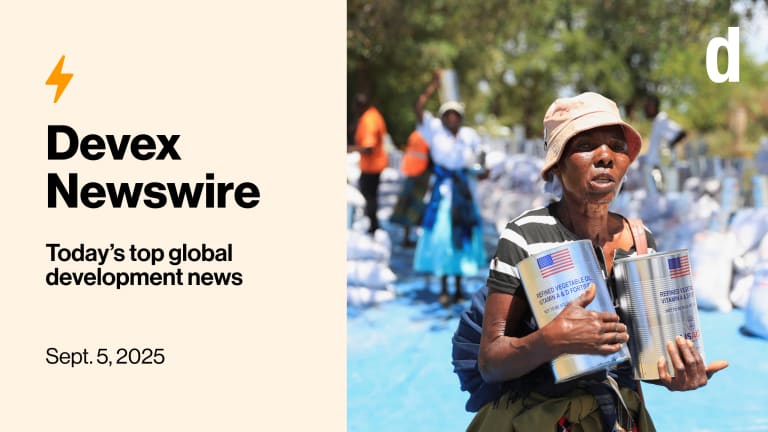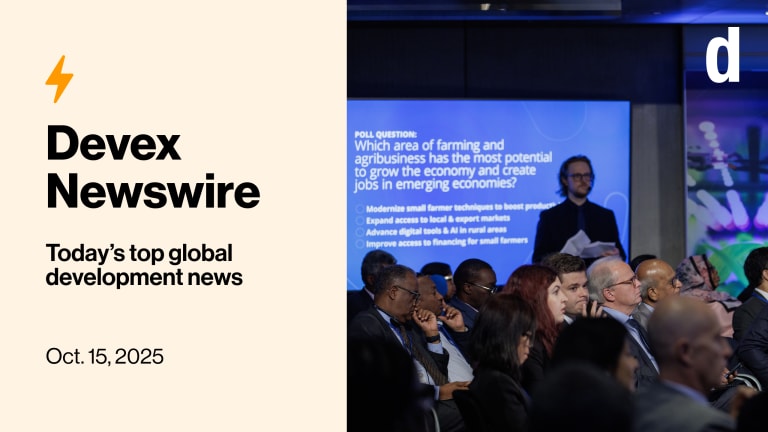Presented by World Bank

Aid officials are finding themselves unwelcome in Sudan as violence reportedly escalates and millions are in danger of famine.
Also in today’s edition: A conversation on funding Ukraine at the Paris Peace Forum.
+ Join us on Nov. 4: What does truly trust-based, long-term support look like? Hear directly from Masana wa Afrika, an independent foundation providing multiyear, unrestricted funding to over 120 grassroots organizations across Africa, and one of its grantees, the Nzeve Deaf Centre, on what their partnership looks like. Don’t miss this event — register now.
Kicked out
In one of Sudan’s deadliest weeks yet, the government has expelled two of the World Food Programme’s top officials, even as reports of mass killings pour in from Darfur.
“The United Nations World Food Programme (WFP) confirms that the Sudanese Ministry of Foreign Affairs has informed us that two of our top leaders in Sudan have been designated as persona non grata, and asked to leave the country within 72 hours, without any explanation,” the agency said. The two are Country Director Laurent Bukera and Head of Operations Samantha Katraj.
WFP warned the move jeopardizes food aid for millions already facing famine. Nearly 20 million people — almost half the population — are in acute food insecurity, and the agency is running a $589 million shortfall. “Working in Sudan has always been, and is particularly now, very difficult,” one WFP worker tells my colleague Ayenat Mersie.
The expulsions follow the Rapid Support Forces’ seizure of el-Fasher, North Darfur’s last government-held city. Atrocities followed: Nathaniel Raymond of Yale’s Humanitarian Research Lab compared the violence to Rwanda’s genocide, while the Sudan Doctors Network said RSF fighters stormed the Saudi Hospital and killed everyone inside. The World Health Organization estimates that at least 460 patients were slaughtered there.
Read: Sudan expels top WFP officials amid escalating atrocities in Darfur
ICYMI: Sudan’s real-time genocide draws comparison to Bosnia and Rwanda
Ice age
Europe is currently debating whether to unlock some $140 billion in frozen Russian assets held at Belgian-based financial group Euroclear and use them as a loan to Ukraine to keep fighting Russia's invasion. But Belgium’s worried about repercussions, either from Russia and its allies or from other nations, such as Saudi Arabia, that will no longer want to house their assets within its borders.
“I think Europe has an opportunity. They have come up with an incredibly creative way to use the frozen assets, Russian assets,” said philanthropist Howard Buffett in an onstage interview with Devex Editor-in-Chief Raj Kumar at the Paris Peace Forum on Wednesday.
“I would ask people in Belgium: If Russia was doing to you what they’re doing to Ukraine, would you not use that money?”
Buffett, who stated at the event that he’s the largest private donor to Ukraine, has stepped in to support agriculture, sending combine harvesters to farmers in the country to facilitate wheat production, and to demining efforts. He’s also published a book of photography based on what he has witnessed on the ground.
Related: From farms to war zones — the down-to-earth son of Warren Buffett
Rhetoric vs. reality
Development budgets are being slashed globally — but is it really because public support has collapsed? Not quite, said Patrick Flynn, a data journalist at U.K. research agency Focaldata. While overall support hasn’t dropped much, it’s become more polarized — shrinking governments’ political will, he told my colleague Elissa Miolene during a recent Devex Pro Briefing.
“The decisions that have been taken by governments follow a kind of direction of travel, which we think has been kind of clear for a long time for those of us that have been working in the public opinion sector,” Flynn said. “These aren't isolated shocks, but maybe part of a broader pattern of changing public opinion as well as ideological shifts.”
At the core, aid still has “a bedrock of goodwill.” But the swing voters that matter most today — lower-income, lower-education groups — tend to distrust it, unlike the more pro-aid swing voters of 15 years ago. Aid has also become tangled up with divisive issues such as gender, race, and climate change, widening partisan divides.
Other hurdles: People overestimate how much money goes to aid, don’t rank it as a top political priority,, and increasingly buy into “zero-sum thinking.” As Flynn explained, “If I’m giving money to a different country, it means that my country is getting poorer and that country is doing better.” That view, he noted, was “one of the key things to [U.S. President Donald] Trump’s rhetoric.”
So how can aid advocates respond? Stick to the basics, Flynn advised. “Look at the fundamentals of what aid is delivering and what is popular among the public,” he said. Language matters too — terms such as “emergency humanitarian assistance” test well, while jargon like “decolonization of aid” falls flat.
As for whether reframing aid is a moral risk, Flynn said it can be done without compromise. Aid can still be true to its mission while appealing to different audiences — “especially in an era where support is basically at risk.”
Read: Is the public still in favor of aid? Yes and no (Pro)
Related: Is aid losing the comms war? And what do we do about it? (Pro)
+ Experience Devex Pro with a 15-day free trial. Explore expert analyses, unlock hidden funding opportunities, connect with key players at exclusive events, and access a wealth of knowledge you won't find anywhere else. Discover all the exclusive content available to Devex Pro members.
‘America First’ food aid
The U.S. Department of Agriculture Under Secretary Luke Lindberg has arrived in Israel to talk food — and specifically, to see how U.S.-grown commodities could be used in so-called America First international food assistance programs around the world.
“We’re talking all about agricultural exports this week in Israel,” said Lindberg, after introducing U.S. Ambassador to Israel Mike Huckabee and Nebraska’s Republican Governor Jim Pillen in a video posted to USDA's LinkedIn page.
The three posed in front of Israeli and American flags to talk about Nebraska’s kosher beef, building partnerships with Israel, and — according to the LinkedIn post — ensuring that “American agriculture is at the heart of any next steps with Israel and the region.” The post added that they will be updating the USDA account with more news from Lindberg’s trip, including visits to Ashdod Port “to receive American commodities.”
Home-field disadvantage
U.K. aid transparency has improved across most government departments, but the Home Office has become less open about how it spends billions in aid, according to a new review by Publish What You Fund. The government-commissioned report found that while eight departments increased or maintained their transparency, the Home Office — which spent £2.3 billion of the U.K.’s aid budget in 2024 — published less data than in 2020 and failed to update or disclose forward-looking activities.
The review highlights that the Home Office is now the only department to have backslid on transparency, despite being the second-largest aid spender after the Foreign, Commonwealth & Development Office. Nearly all of the Home Office’s ODA — 99% — is spent on supporting refugees and asylum seekers within the United Kingdom.
Overall, 37% of non-FCDO ODA spending is now visible in the International Aid Transparency Initiative standard, up from 29% in 2020. Excluding the Home Office, transparency jumps to 83%. Publish What You Fund CEO Gary Forster welcomed the progress but said more needs to be done to embed transparency long term, ensuring taxpayers can scrutinize aid spending and recipients can plan for available funding.
+ Check out our focus page for the latest news and analysis of FCDO and the U.K. aid sector.
In other news
Hurricane Melissa has caused “unprecedented devastation” across Jamaica, affecting a third of the population, crippling infrastructure and agriculture, and leaving the island facing a long and costly recovery, according to the United Nations. [The New York Times]
Sheikh Mohammed bin Rashid Al Maktoum of the United Arab Emirates has launched a 100 million dirham ($27.2 million) national program to boost volunteering in the Gulf country, aimed at engaging the nonprofit sector and creating some 10,000 jobs. [Times of India]
Libya’s foreign ministry has ordered Médecins Sans Frontières to leave the country by Nov. 9, without giving any explanation for the expulsion. [Al Jazeera]
Sign up to Newswire for an inside look at the biggest stories in global development.








